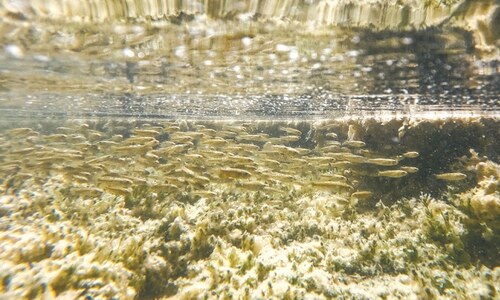PARIS, Nov 2: The offices of a French satirical newspaper that published a special Arab spring edition with a blasphemous image on the cover were destroyed in a suspected firebomb attack on Wednesday.
The attack came after Charlie Hebdo, the editor, renamed the weekly newspaper Charia (sharia) Hebdo for the occasion and featured a cartoon saying: “100 lashes if you don't die of laughter!”
The newspaper's website also appeared to have been hacked, with its regular home page replaced with a photo of the Grand Mosque in Makkah and a message reading: “No God but Allah”.
The web site was later unavailable. Documents and equipment were strewn outside the newspaper's offices after the fire while windows and glass doors were broken at street level and on the first floor.
“Our problem now is to be able to put a paper out next Wednesday,” said Charb, the publisher. “There is soot everywhere, the computers are in my opinion dead, the electrical system is melted.”
The managing editor of left-leaning newspaper Liberation, Nicolas Demorand, said on Twitter that Charlie Hebdo's editorial team would temporarily move into his newspaper's offices until they could find a new home.
Police said the fire at the newspaper's offices in eastern Paris started around 0200 GMT. No one was injured in the blaze, which a police source said was suspected to have been caused by a petrol bomb.
The magazine's publisher said he was convinced the fire was linked to the special edition.
“On Twitter, on Facebook, we received several letters of protest, threats, insults,” which had been forwarded to the police, he said.
“This is the first time we have been physically attacked, but we won't let it get to us.”
French officials were quick to denounce the attack.
“Freedom of expression is an inalienable right in our democracy and all attacks on freedom of the press must be condemned with the greatest firmness. No cause can justify such an act of violence,” Prime Minister Francois Fillon said in a statement.
“Of course everything will be done to find the perpetrators of this attack, and this must certainly be called an attack,” Interior Minister Claude Gueant told journalists at the scene.
In a statement, the newspaper said it was “against all religious fundamentalism but not against practising Muslims”. “We are for the Arab spring, against the winter of fanatics,” it said, adding later that all 75,000 copies of the edition had quickly sold out.
The weekly had said it would publish a special edition to “celebrate” the Ennahda Islamist party's election victory in Tunisia and the transitional Libyan executive's announcement that sharia would be the country's main source of law.
A Paris court in 2007 threw out a suit brought by two Muslim organisations against Charlie Hebdo for reprinting blasphemous cartoon that had appeared in a Danish newspaper, sparking angry protests by Muslims worldwide.
The Danish daily, Jyllands-Posten, sent a message of solidarity to Charlie Hebdo.
“I remember very clearly all the messages we ourselves received in connection with the case,” Lars Munch, who heads the media group that owns Jyllands-Posten, said in an interview published on the paper's online edition.
“It means a lot that one doesn't feel alone in that situation,” Munch said, stressing that “it is terrible and completely unacceptable that a medium's freedom of expression is threatened with violence.”
The head of the French Council of the Muslim Faith, Mohammed Moussaoui, condemned the attack.
“If this was a criminal fire, we firmly condemn it,” he said.
But the council also said in a statement that it condemned “the newspaper's mocking tone with regards to Islam and its prophet (pbuh).” —AFP













































Dear visitor, the comments section is undergoing an overhaul and will return soon.